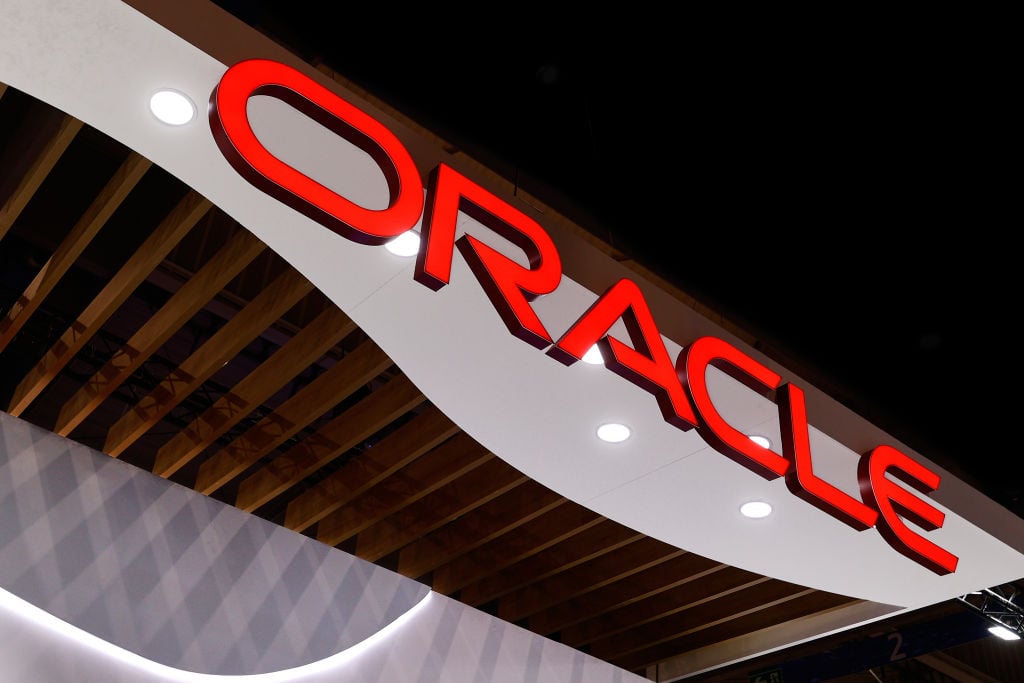Dividend stocks are everywhere, but many just downright stink. In some cases, the business model is in serious jeopardy, or the dividend itself isn't sustainable. In others, the dividend is so low, it's not even worth the paper your dividend check is printed on. A solid dividend strikes the right balance of growth, value, and sustainability.
Today, and one day each week for the rest of the year, we're going to look at one dividend-paying company that you can put in your portfolio for the long term without too much concern. This isn't to say that these stocks don't share the same macro risks that other companies have, but they are a step above your common grade of dividend stock. Check out last week's selection.
This week, I'm going completely contrarian to recent sentiment and pointing out why application software firm Oracle (ORCL 3.85%) could represent an attractive income opportunity for investors over the long run.
Is Oracle outdated?
The biggest fear of investors that's been played out in two straight quarters for Oracle is that the software giant is being left in the dust by its peers when it comes to the cloud-computing revolution. Oracle has traditionally made its money by licensing its software to enterprises and, to a lesser extent, through hardware sales via its purchase of Sun Microsystems. Neither has been a particularly strong growth point for Oracle, with enterprises turning to cloud software that allows employees to access company-critical data from a data center regardless of location rather than just their desktop computer.
Similarly, hardware sales have hit a brick wall -- just ask Hewlett-Packard (HPQ 3.18%). HP's PC sales dipped by 20% in the second quarter, with an even larger revenue hit of 37% from its business critical system segment. I'll give some partial leeway to HP given that it's early on in the midst of a restructuring that'll see 29,000 people lose their jobs, but it's nonetheless seeing hardware sales evaporate. Although Oracle derived only $849 million of its $11 billion in revenue in the fourth quarter from hardware, that didn't stop investors from being concerned about its ongoing underperformance.
If you can't beat them, join them!
Investors jumped all over Oracle like a pack of wild dogs chasing a rabbit following its fourth-quarter earnings release, which featured a revenue shortfall, but I think it's taking all the right steps to ensure a future of outperformance.
If there was any doubt that Oracle was trailing its peers in with regard to cloud-computing development, then many investors' fears should be allayed with not one, not two, but three partnerships announced within the past week! Oracle has come to the conclusion that if it can't catch its peers, it'll simply use its promising cash flow and brand name to bully its way into the sector.

Source: Playing Futures: Applied Nomadology, Flickr.
Perhaps the most intriguing of these partnerships is the knot-tying between Oracle and previously bitter rival salesforce.com (CRM 3.55%). It's no secret that salesforce.com has found its niche as a cloud company that understands what consumers want, but it lacks the branding and customer list to rapidly grow its business. Conversely, Oracle has a monstrous list of vertically integrated companies that'd gladly buy if it met their needs cloud needs, which, up until now, it really hasn't. This partnership could actually turn out to be quite lucrative for both companies, as it perfectly cancels out each other's primary weakness.
However, Oracle also announced two additional cloud partnerships last week: one with NetSuite (N +0.00%) and one with Microsoft (MSFT 3.28%).
Under the terms of the NetSuite partnership, Oracle is planning to combine its human capital management software, which allows enterprises to organize, pay and staff their workforce, with NetSuite's enterprise resource planning software, which businesses use to integrate internal and external management of information between the company and its stakeholders. The two companies anticipate that these combined applications will be available by the end of this year.
Oracle's partnership with Microsoft focuses primarily on its Java-owned software, which it will allow Microsoft to use to leverage its existing cloud-based services with Oracle's existing software tools. It's a bit early to see how this partnership might work out, but on brand name alone, it's intriguing.
Show me the money, Oracle
Overall, fiscal 2013 wasn't nearly the disaster that investors have made it out to be. Cloud-software subscriptions and licensing grew 4% to $10.3 billion, while application software and licensing grew 6% to $17.2 billion. More importantly, Oracle delivered a record non-GAAP operating margin of 47%, which translated into $14 billion in operating cash flow, of which more than 90% was returned to shareholders. With a cash balance in excess of $32 billion, this means two things to long-term investors: share buybacks and dividends!
In Oracle's fourth-quarter press release, it announced that its board of directors had authorized the purchase of up to $12 billion worth of its own shares. Even though share buybacks don't put money directly into shareholders' pockets, they do reduce the number of shares outstanding, making the company appear cheaper on a P/E basis. Based on Oracle's Friday closing value, the company could repurchase around 390 million, or 8.3%, of its outstanding shares.
The other big boost comes in the form of a doubling of its dividend from $0.06 per quarter to $0.12. The new yield pushes Oracle well beyond the 1% mark to a payout of 1.6%. Also, despite doubling its dividend, Oracle is still scheduled to pay out only 17% of its projected 2014 EPS, leaving the company plenty of room to boost its dividend down the road without taking away precious cash flow needed to boost its cloud R&D.
Foolish roundup
Oracle clearly has some challenges to face with regard to investing in its cloud-computing software, but it's made serious inroads over the past week with three potentially lucrative partnerships. With slow-but-steady application software growth, billions in operating cash flow, a hefty $32 billion in cash, and a doubling of its dividend, Oracle is establishing itself as a premier name for income investors to consider moving forward.









